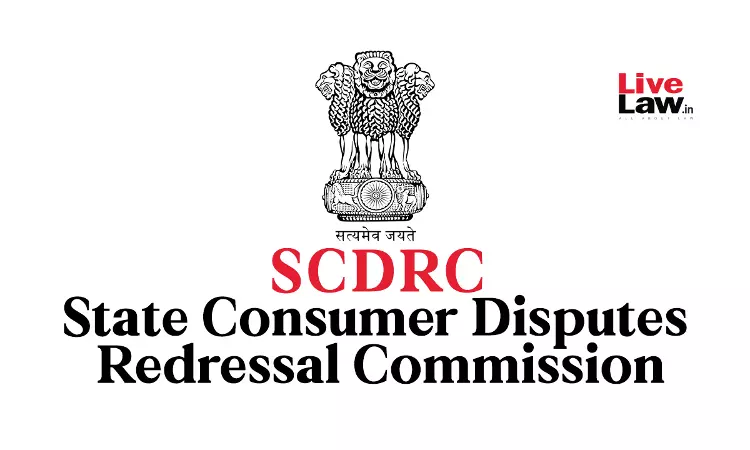- Home
- /
- Consumer Cases
- /
- Mere Allegations Of A Property...
Mere Allegations Of A Property Being Bought For Commercial Intent Is Not A Ground For Rejecting A Consumer Complaint: Delhi State Commission
Ayushi Rani
4 May 2024 1:30 PM GMT
Delhi State Consumer Disputes Redressal Commission, headed by Justice Sangita Dhingra Sehgal alongside member Ms. Pinaki, held Parvsnath Developer liable for deficiency in service due to failure to hand over the possession of the purchased property to the buyer for more than 13 years. The Commission also ruled that mere verbal claims without supporting documentation are...
Delhi State Consumer Disputes Redressal Commission, headed by Justice Sangita Dhingra Sehgal alongside member Ms. Pinaki, held Parvsnath Developer liable for deficiency in service due to failure to hand over the possession of the purchased property to the buyer for more than 13 years. The Commission also ruled that mere verbal claims without supporting documentation are insufficient to establish a property purchase as commercial.
Brief Facts of the Case
The complainant entered into an agreement with the Developer for the purchase of a residential flat in the project “Parsvnath Castle” at King City, Punjab. According to the agreement, the Developer agreed to deliver possession of the flat within 36 months from the commencement of construction, subject to various conditions, including timely payments by the Buyers and force majeure events. The Complainant paid a total of Rs. 9,35,725 to the Developer between 2007 and 2011, which amounted to over 70% of the total price. However, despite these payments, the Developer failed to hand over possession of the flat within the agreed timeframe. Despite the Complainant's inquiries about the construction progress, the Developer did not provide satisfactory responses. After waiting for more than seven years without any progress, the Complainant sent a legal notice seeking a refund of the entire amount along with interest, but the Developer did not respond. Consequently, the Complainant had no choice but to file the current complaint against the Developer.
Contentions of the Opposite Party
The developer argued that the delay in completing the project was due to a global economic slowdown affecting the real estate sector, and they highlighted the Complainant's irregular payment history for the flat. They also raised preliminary objections regarding the complaint's legitimacy, arguing that the Complainant, a Delhi resident, pursued the flat for profit, thus disqualifying her as a “Consumer.” Additionally, they claimed the complaint was time-barred since the Buyer's agreement was signed in 2007, and the complaint was lodged 11 years later. Moreover, they argued the complaint lacked a valid cause of action and involved complex legal matters.
Observations by the Commission
The commission cited the ruling in Aashish Oberai Vs. Emaar MGF Land Limited to establish principles regarding the purchase of property for commercial purposes. Here, the commission emphasized that merely owning or purchasing multiple properties does not inherently indicate a commercial motive. The commission illustrated scenarios where individuals might acquire multiple properties for personal or familial reasons, such as accommodating family members or having residences in different cities for occasional stays. Thus, the acquisition of multiple properties cannot automatically be deemed commercial in nature. Furthermore, in the case of Narinder Kumar Bairwal and Ors. vs. Ramprastha Promoters and Developers Pvt. Ltd. and Ors. it was ruled that the burden of proof falls on the developer to demonstrate with concrete evidence that the purchaser intended to engage in the business of buying and selling properties for profit. Mere verbal claims without supporting documentation are insufficient to establish a property purchase as commercial. In the present case under consideration, the developer failed to provide any substantial evidence to support their assertion that the property in question was acquired for commercial purposes. The commission found no indication in the record that the purchaser was regularly involved in property trading for profit. Therefore, the objection raised by the developer was dismissed, emphasizing that mere allegations of commercial intent are not grounds for rejecting a consumer complaint.
Additionally, the commission referred to a case, Arifur Rahman Khan and Ors. vs. DLF Southern Homes Pvt. Ltd. and Ors., which defined “deficiency of service” as any fault or shortcoming in the quality or manner of service required by law or contract. Failure by a developer to provide a flat within the agreed timeframe constitutes a deficiency of service, as it falls short of contractual obligations. Such delays cause anguish and inconvenience to flat buyers, undermining their legitimate expectations. In the present case, referring to a specific clause in the Flat Buyers Agreement, the commission observed that the developer failed to deliver the flat within the stipulated 36-month period despite receiving a significant portion of the payment years earlier. Consequently, the commission found the developer deficient in its service, having misled the complainant regarding possession timelines and retaining their money for over 13 years.
The commission directed the builder to refund the entire amount paid by the Complainant, i.e., Rs. 9,35,725, along with interest @ 6% p.a. along with Rs. 1,00,000 as cost for mental agony and the litigation cost to the extent of Rs. 50,000.
Case Title: Ms. Sapna Khemani Vs. M/S Parsvnath Dev. Ltd
Case Number: C.C. No. 745/2018


